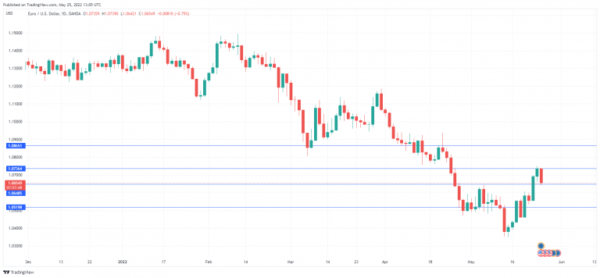Euro falls sharply
The euro has reversed directions on Wednesday and is sharply lower. In the European session, EUR/USD is trading at 1.0663, down 0.67% on the day. The euro was up 1.29% on Monday and extended its gains on Tuesday, hitting a 4-week high, after ECB President Lagarde announced that the ECB would raise interest rates in July.
On the data front, there weren’t any surprises out of Germany. GDP in Q1 rose by 0.2% QoQ, as expected. Compared to Q4 of 2019, the quarter prior to the Covid-19 pandemic, growth was 0.9% smaller, which means that the economy is yet to fully recover from the Covid crisis. The war in Ukraine and Covid-19 have resulted in supply chain disruptions and accelerating inflation, which has hampered economic growth.
German confidence remains in deep-freeze
German GfK Consumer Sentiment came in at -26.0 in May, a slight improvement from the April reading of -26.6, which marked a record low. Not surprisingly, consumers put the blame for their deep pessimism on two key factors – the conflict in Ukraine and spiralling inflation. The GfK survey also found that consumer spending has weakened, as high costs for food and energy have reduced spending on non-essential items.
The ECB Financial Stability Review, published twice a year, echoed what German consumers are saying. The report bluntly stated that financial stability conditions have deteriorated in the eurozone, as the post-Covid recovery has been tested by higher inflation and Russia’s invasion of Ukraine. The report noted that the economic outlook for the eurozone had weakened, with inflation and supply disruptions representing significant headwinds for the eurozone economy.
Given this challenging economic landscape, the euro will be hard-pressed to keep pace with the US dollar.
EUR/USD Technical
- There is resistance at 1.0736 and 1.0865
- EUR/USD is testing support at 1.0648. The next support line is at 1.0519

